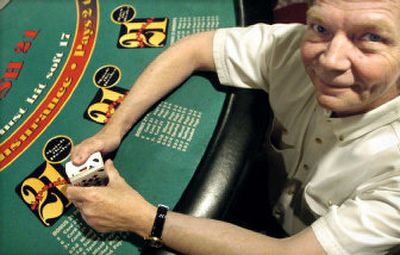Betting on a tax break

Jerry Heggestad will be taking a bigger gamble than his customers Wednesday when he opens his new North Side card room, Aces Casino.
Heggestad is betting that Spokane County commissioners will reduce gambling taxes in unincorporated parts of the county, offering him a better chance at profits than he had at Aces’ former location in Spokane Valley.
“It’s the difference between whether I can stay in business or not,” he said.
Commissioners are considering lowering the county’s tax on card rooms from 15 percent of gross gambling revenues to 5 percent.
Aces’ new location on the northwest corner of Division and Francis is just outside the city of Spokane, where the card room tax is 20 percent of gross receipts. That compares with 10 percent in Spokane Valley.
There are almost no taxes or fees on tribal gaming, said county Commissioner Phil Harris.
“The purpose is not to encourage gambling – it’s to make it fair in the marketplace,” Harris said.
Commissioners will hold a hearing Aug. 2 on the card-room tax as well as on taxes for both commercial and nonprofit pull tabs and punchboards. Commissioners have discussed lowering taxes on charities’ gambling receipts to zero.
Until Aces relocated, there were no card rooms in unincorporated parts of Spokane County.
“If we do this, there may be a migration,” said Commissioner Mark Richard.
That could cost Spokane Valley and the city of Spokane considerably.
For that reason, the city of Spokane also is looking into reducing its gambling taxes, said Spokane Chief Financial Officer Gavin Cooley.
“The concern is that we’re going to lose businesses to those adjacent jurisdictions if we aren’t competitive,” Cooley said.
Spokane collects about $1.4 million a year in gambling taxes.
If city officials decide to lower Spokane’s tax on card rooms, the city would lose about $350,000 for every 5 percent reduction of the tax. But that has to be balanced with the possibility of losing the revenue entirely if card rooms move out of the city or close, Cooley said.
That could happen, said Ron Clouse, controller for the Classic Rock Casino.
While the new Aces casino is just outside the Spokane city limits, the Classic Rock Casino is just inside the city.
“We could move across the street” – and might if the county substantially lowers its card-room tax, said Clouse. “They should be worried,” he said.
In the first quarter of this year alone, the Classic Rock Casino paid Spokane more than $200,000 in gambling taxes.
Spokane Valley could lose out on about $285,000 a year because of Heggestad’s decision to move Aces out of that city. That’s how much the card room paid in taxes between June 2003 and June 2004.
With the tax plus food and promotional costs, Aces lost $107,000 in 2004, Heggestad said.
“Five percent gives us the opportunity to make some money,” he said.
Spokane Valley Mayor Diana Wilhite said the city is not discussing lowering its 10 percent card-room tax to try to keep businesses from moving to unincorporated areas if Spokane County reduces its gambling tax.
“I don’t know if the 5 percent – and that’s a big if – is enough of a difference to make them move,” Wilhite said.
Card rooms aren’t the only gambling enterprises that might get a break from county commissioners.
For-profit businesses in unincorporated parts of the county now pay 10 percent of gross receipts on punchboards and pull tabs, while charities would pay 5 percent of their gross gambling receipts if any were located outside the Spokane or Spokane Valley city limits.
Commissioners will consider lowering all those taxes to anything below the current rates, including zero.
Eliminating taxes on charity gambling operations would be helpful, said Vickie Stevens, operations manager for Big Brothers & Sisters Bingo, but she said she isn’t banking on it.
“I’m a believe-it-when-I-see-it kind of person,” Stevens said.
Big Brothers & Sisters paid almost $78,000 in gambling taxes to the city of Spokane last year.
Taxing charities doesn’t make sense, said Richard, who added that such gambling tax money could be put to better use serving the charities’ clients.